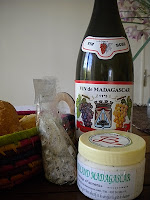Guess: Why is This TV off?
A. We’re participating in ‘No TV week’
B. We’re saving energy by watching on odd days only
C. A cockroach family has nested itself inside the TV
D. Lighting struck our house and destroyed ALL our electrical equipment
Damn damn, the answer is number D. It’s one of those things that are only supposed to happen to other peopls..until it happens to you! Bummer.
Last Friday Soleine and I are playing games by candle light because power has gone off in our home. It’s raining and there’s a thunderstorm. We’re counting the seconds between lighting and thunder, it still far away. Suddenly the house gets lit up followed immediately by the loudest sound I have ever heard. Sparks of fire are flying around in your garden. Holy cow.
 |
| Sensor box exploded after lightning struck |
We’re fine, because I had switched of our modem as well as the multiplug in the TV corner. When it turns out that the power has returned to all our neighbors’ homes we’re learning the horrid truth: lightning has struck a sensor box that controls our garden lights placed on our pine tree. The box has exploded, but that’s not all! It appears that the lighting power (what voltage would that be - I have no internet to look it up) has gone into the electricity cable connected to that sensor. Two fuses burnt, but Michel manages to repair those. Power to the house is restored.
We’re still thinking we got away without major damage until we turn on the TV. Nothing. CD player? Nothing. DVD player? Nothing. Modem? Nothing, Telephone? Nothing… Today we got confirmation from the shops and repairmen…all our electrics are fried! Beyond repair. The only thing in our living room that is still working is our Christmas tree.
Lesson learned for the season, when in thunderstorm:
PULL ALL PLUGS YOU CAN FIND IN YOUR HOUSE OUT OF THEIR SOCKET!!!!!!
PULL ALL PLUGS YOU CAN FIND IN YOUR HOUSE OUT OF THEIR SOCKET!!!!!!
Merry Christmas anyway.


















































